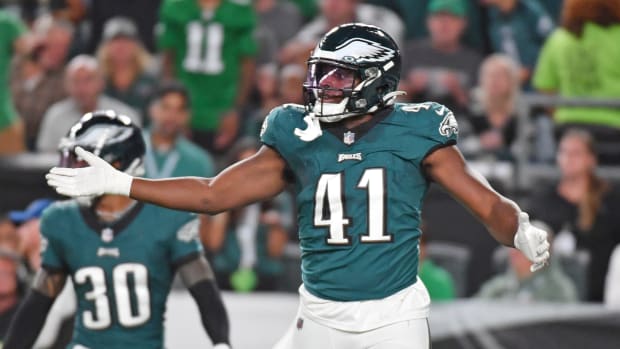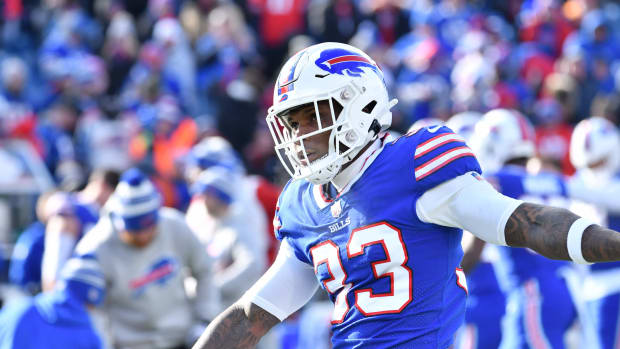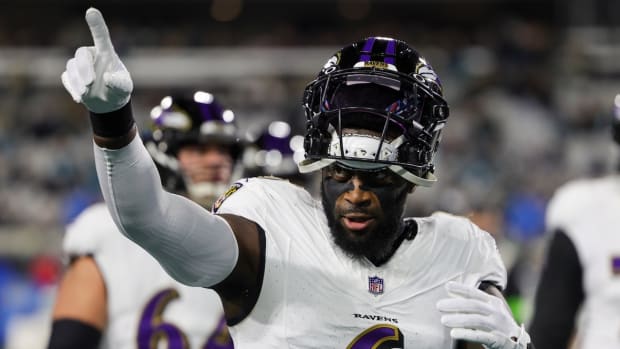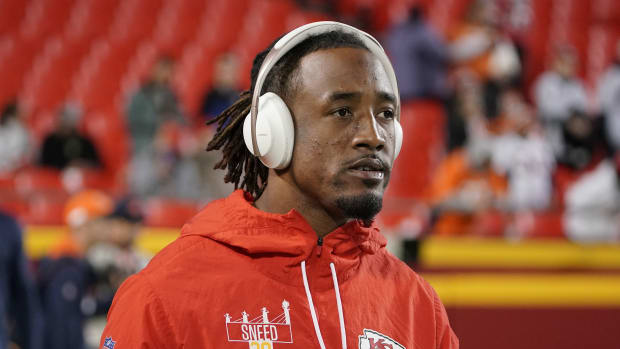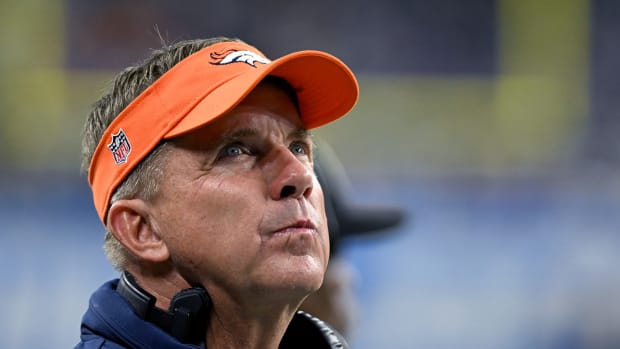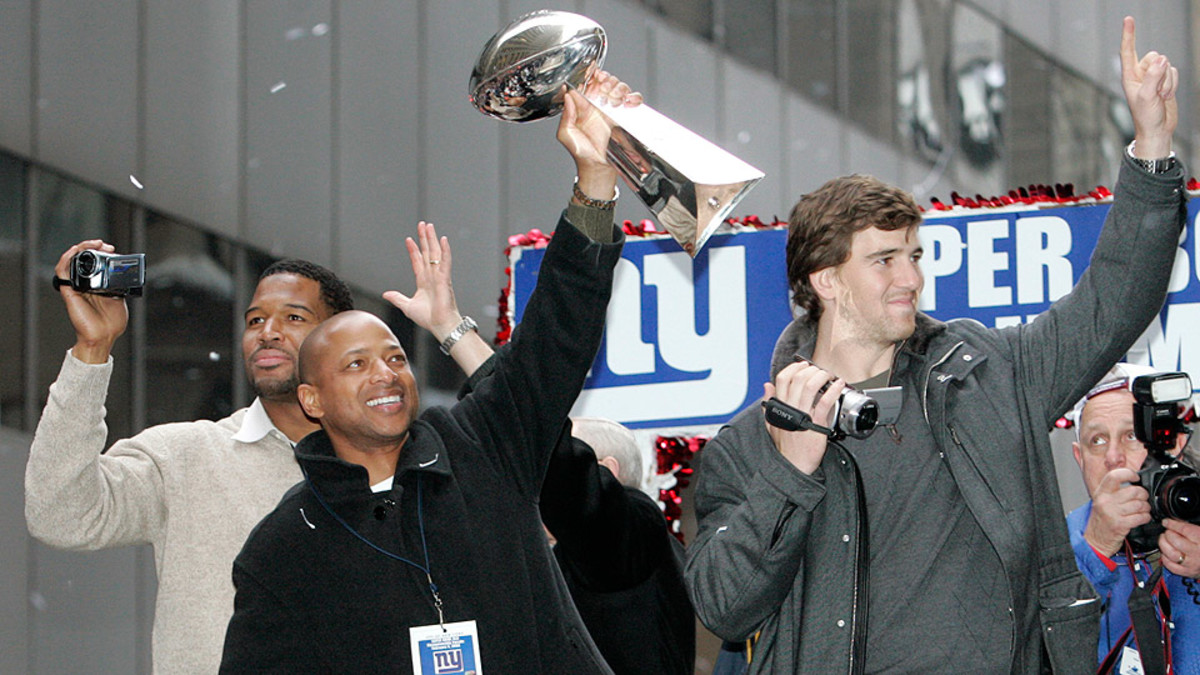
Finding Giants an improbable success story on both sides of camera
"Your first three picks, everybody thinks those guys have to come in and contribute in some kind of way. You might even get a couple of starters out of those three picks. But on the backside of your draft, we always talk about, 'This is where we really make our money. We have to get some diamonds out of the rough on the backside.' And we were able to do that. It's really a testament that there's probably more diamonds in the rough than you would expect."
That's what New York Giants general manager Jerry Reese said at the 2008 scouting combine, when I asked him about the players selected at the backend of any draft. Reese's team had just come off their improbable win over the New England Patriots in Super Bowl XLII, and players like David Diehl (fifth round, 2003), Justin Tuck (third round, 2005), Brandon Jacobs (fourth round, 2005) and Ahmad Bradshaw (seventh round, 2007) were key to that win and to the future of the team. It's been just as true in 2014: tight end Larry Donnell caught three touchdown passes against the Redskins on Sept. 25, and very few people outside the building had heard of the undrafted third-year man from Grambling before that.
• Complete coverage of Week 5 action | Sunday afternoon superlatives
None of this would have happened without the scouts. And that's the story Finding Giants, the new NFL Films series, tells in four parts. The series premiered on Sept. 30, and will run on Tuesdays through Oct. 21. You'll see the Giants' scouts on the road, talking to coaches, meeting to agree on their best prospects, diving over and over into what kinds of players they want for their team. You'll hear Giants CEO John Mara talk about his father, Wellington Mara, who also owned the team, and how the elder Mara most enjoyed the time he spent with the scouts. You'll see those scouts miss first steps and graduations and other important family events, and you'll see families try to work around it. Finding Giants is a fascinating look inside a crucial part of football that has never been highlighted to this degree.
But perhaps the most improbable player in this story -- the real undrafted free agent -- is producer Phil Michelson, who went out and got this series done from conception to completion in a very improbable way. Michelson has been involved in the movie business for years, and the bridge between his world and the world of football was built in a sandbox in Brookline, Mass.
• Watch the trailer for Finding Giants here
"When my oldest was a baby, we used to hang out at this playground by our house," Michelson told me. "One of our neighbors was a guy named Jason McLeod, who worked with the Red Sox at the time, and is now with Theo [Epstein] and the Cubs. So, we're hanging out at the sandbox with the kids, and I would talk with him about scouting, because I was fascinated by it. One day, we're talking about scouting, and I'm walking to the Starbucks at the end of my street, and I see a guy who looks like he's in his sixties, wearing a Rams shirt. It was a shirt you couldn't buy as a fan; it was obviously a club shirt. I asked him if he worked for the team, and he did, and we started talking."
That man was Dick Daniels, who is currently an NFL consultant in the area of football operations and NFL Ventures. He worked as a coach, scout and executive for seven different teams and was involved in eight Super Bowls over a 47-year period. Daniels told Michelson about the history of scouting, and it was Daniels who really put the germ of the project in Michelson's head.
Don't look now, but these newly 3-2 teams also have division leads
Along the way, there was one name that connected Michelson's world with Daniels': Bill Nunn.
Bill Nunn Sr. was hired by the Rooney family in the 1970s to scout and find black talent for the team -- he was involved in the selections of L.C. Greenwood and Mel Blount and John Stallworth and on and on over the years. Bill Nunn's son, Bill III, is probably a bit more famous as Radio Raheem in Spike Lee's Do the Right Thing. And that's where things started to coalesce for Michelson -- he worked on that movie and kept in contact with Nunn III. The younger Nunn was also in Lee's Mo' Better Blues, which Michelson also worked on.
"So I called Bill after I heard this story, and I said, 'Bill, why didn't you tell me that your dad was one of the greatest scouts in NFL history?' And he said, 'You never asked.'"
Michelson was inspired to try and interview Nunn Sr., who passed away in May of 2014, but it didn't happen.
"These guys, they're so great at what they do and so reticent to publicize it, and it's a certain personality type that isn't looking for attention, but really loves what they do," Michelson said.
Despite divergent paths, Fitzgerald, Welker forever linked by 2004 draft
"So scouting is on my mind, and I'm watching the draft, and the coverage of the draft. And I realize that every year -- and this isn't a knock on the network shows -- but the way the draft is presented is always the same way. It's always presented with the players coming in. And I was saying, 'What's on the other side of the equation? What's the 180 of that? Who are the guys who are looking at the combine, at all these drills, and what are they seeing?"
Michelson put a plan together and contacted Steve Sabol at NFL Films a few years back. There was one hitch to this notion: NFL Films doesn't work with outside producers. They're a league entity, and they hire from within, and it's a system that's obviously worked over the years. Michelson's entreaty to Sabol was the rough equivalent of a Division III player calling an NFL team out of the blue, no matter how renowned he may have been in his own industry.
Michelson needed a powerful hook, and he got one. When he pitched the idea of a series on scouting, pointing out that Films had never done anything similar, Sabol was sold.
"There was a pause on the phone, and Steve said, 'Oh, shoot. Now I've got to work with you.'"
Michelson referred to three heroes who got the ball rolling -- Daniels, Sabol, and Giants CEO John Mara. And it took thinking outside the box with Mara, because as Michelson explained, Films gets orders from the league to create for this or that network, and there isn't necessarily a lot done from within unless there's a vessel. Sabol finally made a deal with Michelson -- if he could go out and find the money for the project, get a network involved, and get a team on board, Films would co-produce it with him.
Michelson talked with people like Kenny Chesney and Jon Bon Jovi -- longtime football fans with very deep pockets -- and discovered that he first needed a team on board to make that pitch more real. He had tried to talk with the Patriots and didn't get a response, but when he left a message for Mara out of the blue, Mara returned his call the next day.
The two men struck up a bit of a phone friendship over the course of a year, and Michelson would pick Mara's brain about a number of things, but it always came back to scouting.
"After a year, I reached out to John about this. Films has told me that if a team will let us in, this can happen. Would you consider letting us in?"
Mara talked with Reese and the team's personnel department and agreed to set a meeting with Michelson. When Michelson explained the story he wanted to tell, the Giants saw the value, and shooting started two weeks later. The team started production in April, and shooting wrapped up two days after the draft, when all the names came off the board.
"The Giants are his family business." Michelson said of Mara. "His grandfather Tim started the team, and his father Wellington was not only an owner, but he loved the scouts. John talks about that in the show, how his dad's greatest moments were hanging out with the scouts and watching players. Scouting to the Giants has always been in their DNA -- it's a valued part of the organization. So, for John, it was a way to show that side. It was really a way of honoring his father's legacy."
From there, things popped into place. Films sent its producers on the road to capture the scouting trips, and as they so often do, created a singular vision with Films' instantly recognizable style. Michelson specified Jay Jackson as his counterpart at Films who kept the vision on line, and the experience gave him a look into the mind of Sabol, who Michelson called "my Scorsese."
"You know what that is? That's the vision of Steve Sabol," Michelson said of the final product. "He was a filmmaker, and he loved football. And when Films looks at a project, they're not thinking about budget and how they're going to save money. They're thinking about how they're going to tell the story correctly. How do we tell the story in a way that fans will feel the love and passion for the game that we have? That's what separates NFL Films. It comes from a place of artistic passion, and purity, and love of the game."
In imparting wisdom about a side of the game that's been hidden to a large degree throughout the NFL's history, Michelson learned several things about the way the league works. Starting with what makes a successful scout, and how on the best teams, scouts and coaches and executives work in tandem with a singular vision. In that regard, teams are the same as Films.
"I think that's the mark of a good scout, too -- if you know that you need a guy who's going to get to the quarterback on third down, and maybe he's not great on run defense, but he's great at getting to the quarterback -- well, if that's what you need him for, he fits your system," Michelson said. "And hopefully you can coach him into tackling better on running downs. But don't put him in a position where you bring him in on first down, and everyone's going to run the ball right at him, because that's not his strength. You're putting a kid in a position to fail."
Michelson now has other irons in the fire. He's working on a documentary on the history of MAD Magazine with Terry Gilliam, a project that's been backed by South Park's Matt Stone and Trey Parker. He's also working on a series detailing the history of soul music with longtime music executive Ed Eckstine, the son of famous vocalist Billy Eckstine. But Finding Giants gave him the sports bug all over again, and he wants to tell more stories in this arena. When I asked him what he learned about football through all this, he was eager to answer.
"There are two sides. On the football side, it gave me an appreciation of just how hard it is to evaluate talent. And it gave me a really strong desire to learn more and more about this. Because these guys are awesome guys ... and this job was sort of like fantasy camp, and I was getting paid for it. When I was 13, I wanted to be a pro quarterback. I still have books from by Bar Mitzvah that I was using as research for this project.
"But what I really learned was the human side of the league. That's where I took the most from it. As I did this show, I got to meet a number of people -- not just in the Giants organization, but other organizations as well -- and these scouts leave their families for 200 days a year. They miss things like their kids walking for the first time, school plays and everything else, to find those great players. So, what it really showed me was that the NFL as a industry is full of wonderful, hard-working people who go about their jobs and don't get the glory for it.
"But when the league shines, it wouldn't without them."
































